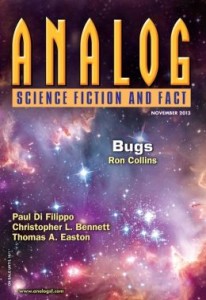
While casually thumbing through the November 2013 issue of Analog Science Fiction and Fact, I was thrilled to find a new installment by Jack McDevitt titled The Eagle Project. As soon as I found the story, I immediately turned back to the cover to figure out how I had missed the SF master’s front page billing. Mystery solved – I didn’t miss it because the name was not there. Victoria Green’s beautifully illustrated starscape on the cover has a few authors listed, but no mention of McDevitt.Perhaps the omission from the cover is due to the length of the story. The Eagle Project is a very-short piece barely stretching across four pages (this includes the story and author’s name taking up half of one page and an ad for the September 22, 2013 Brooklyn Book Festival in NYC taking up half of another page). But come on. McDevitt is a master at packing brilliant content regardless of the word count. This story is no different.
The story is centered on the NASA missions called The Eagle Project, where thousands of nanoships were launched from a moon based laser cannon towards some of the nearest solar systems (at 1/10 light speed) in search of life. Now 134 years later, the results are finally coming back from Tau Ceti where the last of the Eagle flights are descending on a distant planet. NASA’s chief operations officer Gordon Hall is anxiously awaiting the returning signal. The narrator is sent by the President of the United States to join Hall in Huston and squelch any ideas of reviving the project once the last of these disappointing results come in.
There are two prominent elements in this story that make it stand out from the norm – relevancy and accuracy.
Less than a year ago, it was noted that one of the planets orbiting Tau Ceti is on the edge of what some consider the outer edge of a habitable zone around the star. It may be an Earth like planet. This and the star’s similarities to our own Sun have sparked a lot of interest in the search for little green men. There is nothing better than including current events in a story that will no doubt withstand the test of time many years from now.
Given the distance between here and Tau Ceti (abt. 11.9 light years), 134 years to travel at ten percent light speed is within reason including any necessary acceleration and deceleration. McDevitt does not try to confuse the reader with techno-jargon or mixing distance and time (like doing the Kessel Run in 12 parsecs). He just does the math.
Sure these elements are important to good storytelling, but there is a third component that is evident in almost every story by McDevitt. He uses real characters and real concerns in “wow” situations and makes the story believable. The narrator is the realist, tired of the high costs of past mission failures and hoping the notion of finding life elsewhere would just go away. When he states, “There’s just no point,” the consensus of many doubters is blunt and to the point. Gordon Hall is the optimistic voice, but even he has second thoughts about how he has spent his life. If there is a moral to this story, it is that – if “we” don’t try reach out, who will.
The Eagle Project may be just a little story by Jack McDevitt, but it is heavy with thought provoking content and disserved much more cover recognition than Analog provided – which was none. The publishers did accomplish one positive thing here. I will look more closely every time I thumb through their issues. I don’t want to chance missing a great story.










